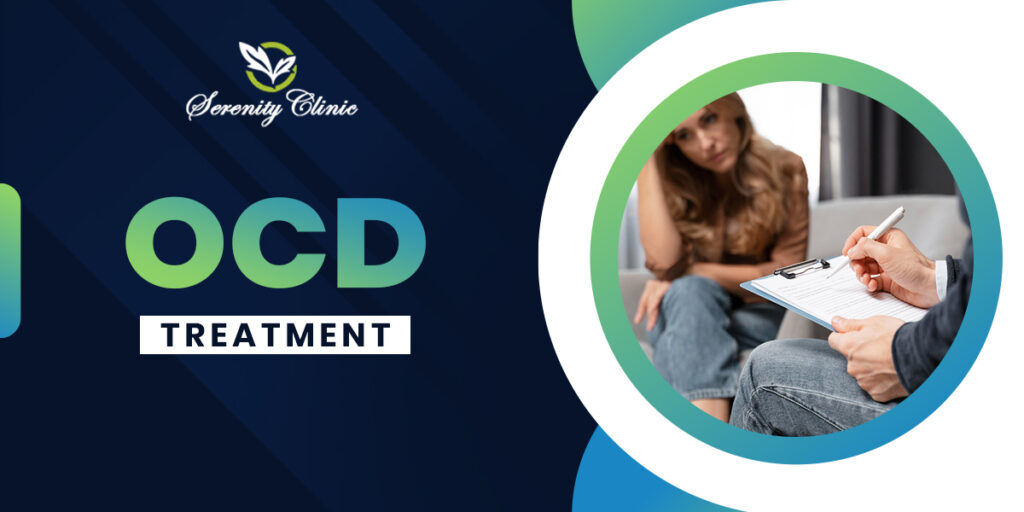Obsessive-Compulsive Disorder (OCD) is a mental health condition that affects millions worldwide. It is linked by persistent, intrusive thoughts (obsessions) and repetitive behaviours (compulsions) that interfere with daily life. While OCD can be challenging to manage, various treatment techniques have proven effective in reducing symptoms and improving quality of life. Here are some of the best ocd treatment techniques that can help you manage this condition.
Step 1: Understanding OCD
The first step in managing OCD is understanding its nature. OCD is not simply about being neat or overly concerned about germs. It is a complex disorder driven by anxiety and compulsions that temporarily relieve distress. Recognizing that OCD is a medical condition, not a personality flaw, helps reduce stigma and encourages seeking proper treatment.
Step 2: Seeking Professional Diagnosis
A formal diagnosis from our experts at Serenity is crucial. Psychiatrists or psychologists use criteria from the Diagnostic and Statistical Manual of Mental Disorders (DSM-5) to assess symptoms. A thorough evaluation helps distinguish OCD from other anxiety disorders and ensures an appropriate treatment plan.
Step 3 Cognitive-Behavioural Therapy (CBT)
Cognitive-Behavioural Therapy (CBT) is the most effective psychotherapeutic treatment for OCD. Within CBT, Exposure and Response Prevention (ERP) is the gold standard.
- Exposure involves gradually confronting obsessive fears in a controlled setting.
- Response Prevention teaches individuals to resist compulsive behaviours associated with their obsessions.
For example, someone with contamination fears might touch a doorknob and refrain from washing their hands immediately. Over time, this reduces anxiety and weakens compulsive urges.
Step 4: Medication Management
Selective Serotonin Reuptake Inhibitors (SSRIs), such as fluoxetine, sertraline, and fluvoxamine, are commonly prescribed to help regulate serotonin levels in the brain. These medications can reduce OCD symptoms, but often work best when combined with therapy. A psychiatrist will determine the appropriate dosage and monitor potential side effects.
Step 5: Practising Mindfulness and Stress Reduction
Mindfulness techniques help individuals become aware of their thoughts without reacting impulsively. Practices such as meditation, deep breathing, and progressive muscle relaxation can significantly reduce anxiety. Regular mindfulness training strengthens emotional regulation, making it easier to manage intrusive thoughts.
Step 6: Establishing a Support System
Having a strong support network can make a huge difference in recovery. Family, friends, or support groups can provide encouragement and accountability. Many people find online OCD communities helpful for sharing experiences and coping strategies.
Step 7: Implementing Lifestyle Changes
Healthy habits play a key role in managing OCD symptoms. These include:
- Regular Exercise – Physical activity reduces stress and anxiety.
- Balanced Diet – Nutrient-rich foods support brain health.
- Adequate Sleep – Poor sleep exacerbates OCD symptoms, so maintaining a proper sleep routine is crucial.
- Limiting Caffeine and Alcohol – These substances can heighten anxiety and should be consumed in moderation.
Step 8: Using Self-Help Techniques
Self-help books, guided journals, and mobile applications focused on OCD can be valuable tools for managing symptoms. Some well-known books include Brain Lock by Dr. Jeffrey Schwartz and The OCD Workbook by Dr. Bruce Hyman.
Step 9: Identifying and Managing Triggers
Keeping a journal of obsessive thoughts and compulsive behaviours can help identify patterns. Recognizing triggers allows individuals to develop coping mechanisms, such as replacing compulsions with healthier alternatives.
Step 10: Considering Advanced Treatments
For severe OCD cases that do not respond to traditional treatments, alternative therapies may be considered, such as:
- Deep Brain Stimulation (DBS) – A surgical procedure that targets specific brain areas.
- Transcranial Magnetic Stimulation (TMS) – A non-invasive method using magnetic fields to influence brain activity.
- Intensive Outpatient Programs (IOPs) – Structured treatment programs for individuals needing more comprehensive care.
What Are The Benefits of Treating OCD Conditions?
Effective treatment, which may include therapy, medication, or a combination of both, offers several key benefits.
- Reduced Anxiety and Distress – Treatment helps individuals manage obsessive thoughts and compulsive behaviours, leading to a significant reduction in anxiety and emotional distress.
- Improved Daily Functioning – With proper intervention, individuals can regain control over their routines, allowing them to focus on work, studies, and personal life without intrusive thoughts disrupting their activities.
- Enhanced Relationships – OCD often strains relationships due to repetitive behaviours and avoidance patterns. Treatment helps improve social interactions, fostering better communication and understanding with family and friends.
- Better Mental and Physical Health – Chronic stress caused by OCD can lead to other mental health issues like depression, and physical ailments such as headaches or fatigue. Managing OCD contributes to overall mental and physical well-being.
- Increased Self-Confidence – Successfully managing OCD symptoms empowers individuals, boosting their confidence and improving their quality of life.
How Long Does It Take to Recover From OCD?
Obsessive-Compulsive Disorder (OCD) is a chronic condition, but with proper treatment, many individuals experience significant improvement. The recovery timeline varies depending on factors such as symptom severity, treatment type, and individual response.
Cognitive Behavioural Therapy (CBT), particularly Exposure and Response Prevention (ERP), is the most effective treatment. Many patients begin to notice improvements within 12 to 20 weeks of consistent therapy. However, full recovery may take months or even years, especially in severe cases. Medications like Selective Serotonin Reuptake Inhibitors (SSRIs) can take 6 to 12 weeks to show noticeable effects, and adjustments may be needed for optimal results.
For some, OCD symptoms may not completely disappear, but they become manageable with long-term therapy and coping strategies. Factors such as stress, environmental triggers, and coexisting conditions can influence recovery duration. Maintenance therapy and lifestyle changes, including mindfulness and stress management, help sustain progress. While OCD is considered a lifelong condition for many, early and consistent treatment greatly improves quality of life.








